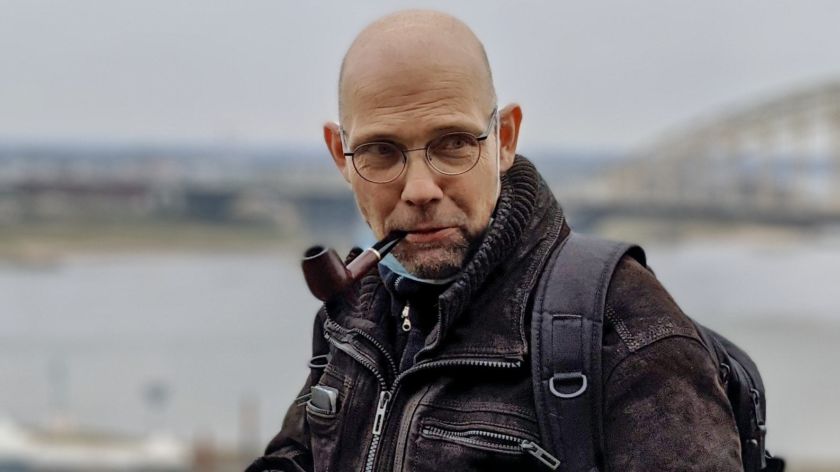In memoriam: Thomas Eimer (1975-2021)
-
 Thomas Eimer. Foto: Christian Feld
Thomas Eimer. Foto: Christian Feld
Lecturer in International Relations Thomas Eimer passed away last week after a brief struggle with pancreatic cancer. A portrait of an anti-authoritarian pipe smoker with a passion for the cause.
In 2012 Thomas Eimer applied for a vacancy for lecturer in International Relations at Radboud University. The German, who obtained his PhD at the Freie Universität in Berlin, stood out during his application for his creative and refreshing view on education.
Students liked this approach. Eimer, both a political scientist and a philosopher by training, brought together different perspectives in his lectures. Students really enjoyed his lessons and felt they were taken seriously by the lecturer, who took the time to answer their questions.
Eimer always approached students as equals. He was convinced that a hierarchical relationship was an obstacle to good relationships between student and teacher. As a thesis supervisor, he gave students the space to choose the themes that were close to their heart. He sometimes compared writing a thesis to visiting a foreign city: you can go there with a route mapped out with all the tourist highlights, but walking around on spec is also an option. According to Eimer, you make the best discoveries in dead-end alleys.
Calcutta and Manaus
As a researcher Eimer specialised in Critical Political Economy, more specifically in property law, mainly in India and Brazil. He took pride in telling not only the story of landowners and paramilitary groups, but also that of the original inhabitants who have been deprived of their land; his heart lay particularly with the oppressed and the invisible.
Colleagues knew Eimer as someone for whom the personal and scientific have always been linked. When he did not get funding for a research project, he travelled on his own to Calcutta or Manaus during the summer holidays to engage with inhabitants about their political struggles and oppression. This was not without risk: several times he had to flee with activists at the risk of his own life. A number of activists he became friends with were later murdered.
The fight for justice was in Eimer’s blood. If he considered something was not fair, he would fight, for example as a member of the faculty participational bodies and of the education committee. As a German, it could sometimes frustrate him that he could not fathom how power relations worked in the Dutch academic world, where the use of the polder model is widespread. He just wanted to know where the power was so he could kick against it.
Pipe smoker
Eimer grew up in Cologne and later moved to Berlin, a city that was very important to him and about which he could talk with great melancholy. Colleagues describe him as an intellectual who linked his research to literature and music. He actually saw himself more as a writer and a philosopher than a scientist.
You could just bump into him in the centre of Nijmegen, discussing topics with colleagues or friends on a terrace, or – in the run-up to elections – handing out flyers for the local section of the SP. In the department he looked after new colleagues from Germany because he knew what they could encounter in the Netherlands. On campus you could find him smoking a pipe on the central reservation of the Heyendaalseweg. He had actually wanted to stop smoking, but he found the smoking ban that took effect on campus eighteen months ago so paternalistic that he decided to give the pipe a new lease on life.
Investigative journalist
Eimer was recently feeling less at home at the university. The structural underfunding and the resulting workload in particular were a thorn in his side. Like many colleagues, he struggled with the division of his working hours, and in addition, he had to deal with a number of setbacks. After nine years in Nijmegen, he was still a university lecturer, despite his publication list. In order to fight more effectively against injustice in the world, he considered starting a career as an investigative journalist parallel to being a professor. He wanted his work to reach a wider audience than just the privileged academics who have access to password-protected scientific articles.
Eimer was unsure whether he wanted to continue living in Nijmegen. As a bachelor he did not always feel at home in a city full of young settled people. He had advanced plans to move to Schiedam, a little closer to the Randstad, but this never happened.
Lemon sorbet
Everything changed in November, when Eimer was diagnosed with pancreatic cancer, which he found horrible, unfair and Scheisse. For as long as he was able, he took consolation in the statistical outliers showing that people could live with the disease for years. When the doctors told him that he could no longer be treated, it was a shock to him.
He wanted to use the little time he had left as efficiently as possible. While in the hospice, Eimer received students to discuss papers or their thesis. He submitted further research proposals together with colleagues, and posted a number of papers that were not completely finished on his website. His life project had been to write a book about property from a philosophical angle, but when he realised that this was no longer possible, he turned it into a manifesto.
Eimer, who could no longer eat solid food, survived the last month of his life on oxtail soup and lemon sorbet. Relatives, friends, and colleagues who visited him in the hospice were touched by the beautiful, open, and honest conversations they had with him.
Thomas Eimer passed away last week. He was 46 years old. At his request, part of his estate goes to the Rosa Luxemburg Foundation in Germany, the scientific bureau of Die Linke, a German democratic-socialist political party.
This eulogy is based on conversations with Maurits Meijers, Angela Wigger, Gaard Kets and Luuk Schmitz.



